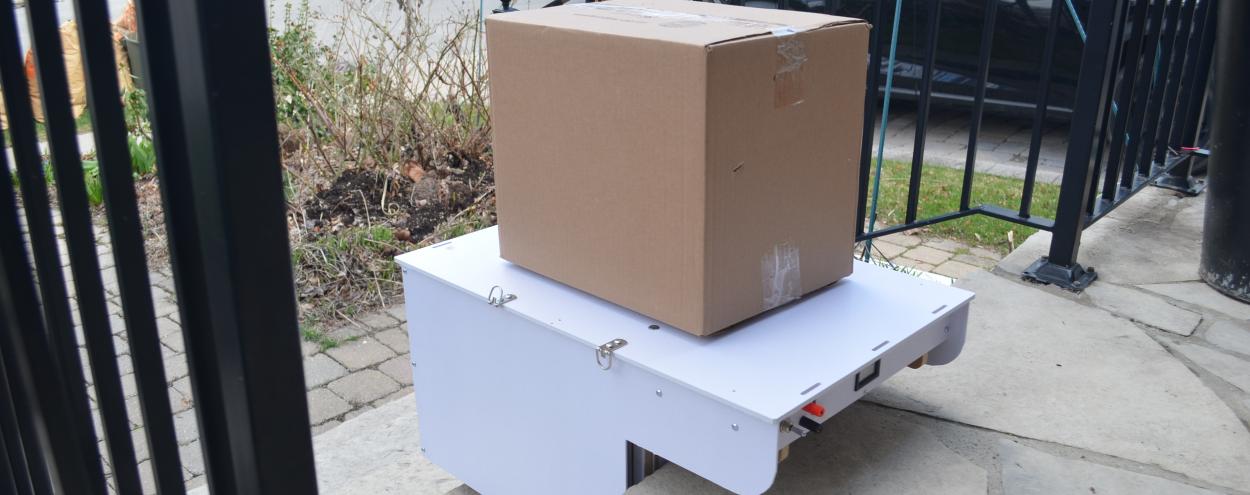
The COVID-19 pandemic has shown that resilience and innovation is essential for local business, no matter their size. To help companies tackle these challenges, George Brown College was recently successful in a pair of Mitacs/AGE-WELL applied research project applications, totalling over $100,000, that will leverage the talent and expertise of George Brown employees and students.
ROSA: A service robot for vulnerable Populations
Longtime George Brown partner Quantum Robotics Systems (QRS) will work with researchers from the Centre for Construction & Engineering Technology and the University of Guelph to further develop their stair-climbing domestic service robot, ROSA (pictured), enhancing its ability to travel along complex routes (including staircases). ROSA will be an assistive device for seniors, disabled persons and caregivers, and will also have non-contact delivery and mobile disinfection applications during the COVID-19 pandemic. George Brown researchers will work on a more advanced physical prototype, while the University of Guelph will develop control and path-planning algorithms to allow ROSA to operate autonomously within homes and buildings.
“In the context of the pandemic, we see ROSA as an assistant that’s always available for older adults, who might be isolated from their family and caregivers,” says Dr. Frank Naccarato, President of Quantum Robotics Systems. “We hope to have a more robust ROSA that will be genuinely useful for seniors and people with mobility issues who need help with day-to-day tasks.” See an earlier prototype in action.
The power of peer support with Java Group Programs
The Java Music Club (JMC) is an evidence-based program used in over 1,100 care homes in Canada and the US to foster social engagement and wellbeing. But due to COVID-19, thousands of its participants are now left without social outlets and effective programming. With precautions still in place for vulnerable seniors in residential care, Java Group Programs is partnering with Revera and researchers from George Brown College and Ryerson University/Toronto Metropolitan University to develop and test a digital version of their peer support program.
“Social isolation and loneliness for seniors is a huge problem for the senior living industry, made worse by COVID-19,” says Clayton MacKay, CEO of Java Group Programs. “Now, working with George Brown and Ryerson [Toronto Metropolitan University], a new Java Digital version is being created that can be used when physical distancing makes it impossible for seniors to meet face-to-face.”
The research team is led by Albert Danison (George Brown College) and Dr. Alexandra Fiocco (Ryerson University/Toronto Metropolitan University), and a team of student researchers.
One of these students, Alexander Koumarianos, had previously completed a Marketing diploma within George Brown’s Centre for Business, and is currently in his third-year of the Computer Programmer Analyst program. The project is already bringing together both of those worlds in surprising ways, he says: “I’m getting a real world application of what I’ve learned, with a practical challenge to solve. It’s not just developing an app or designing a website—it’s helping people connect in a meaningful way.”
“This unique platform will help solve isolation and loneliness in over 95,000 care homes and for over 12 million aging seniors living alone,” says Clayton. “The project is off to a great start and we’re grateful to everyone involved.”
Mitacs is a national, not-for-profit organization that has designed and delivered research and training programs in Canada for 20 years, building partnerships that support industrial and social innovation in Canada. AGE-WELL is Canada’s technology and aging network, dedicated to the creation of technologies and services that benefit older adults and caregivers.
